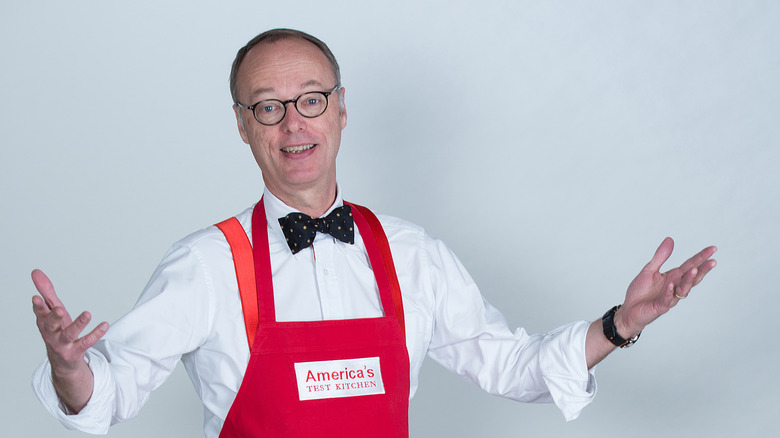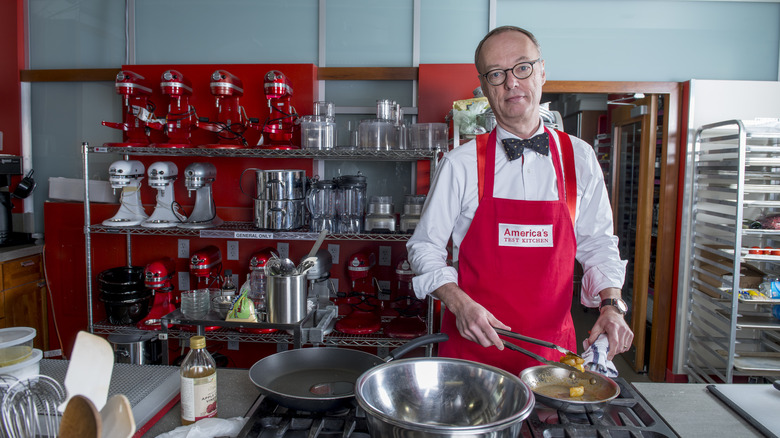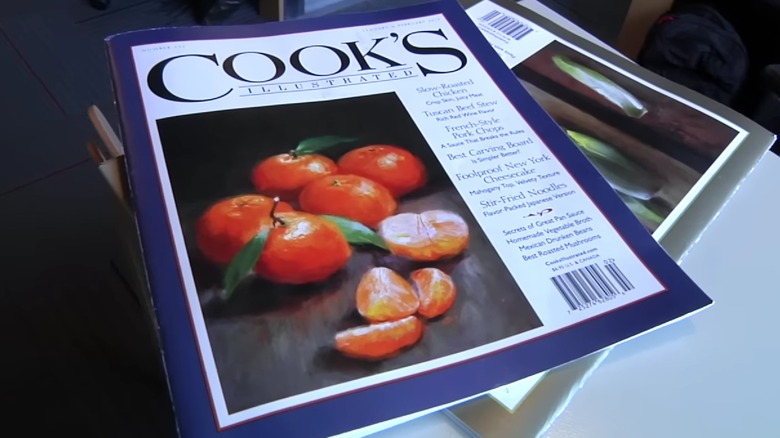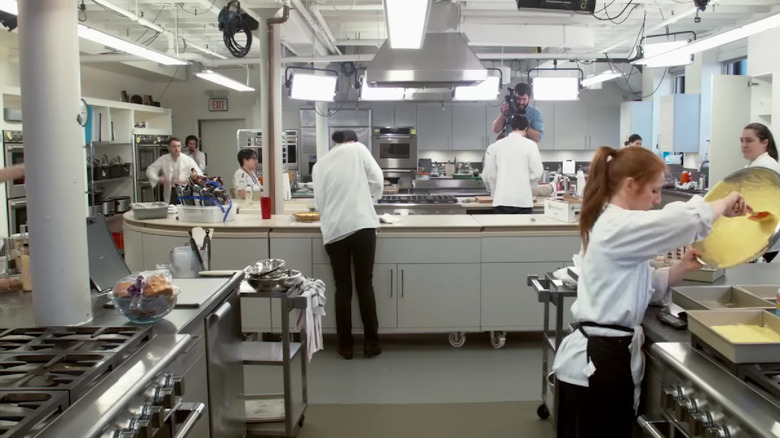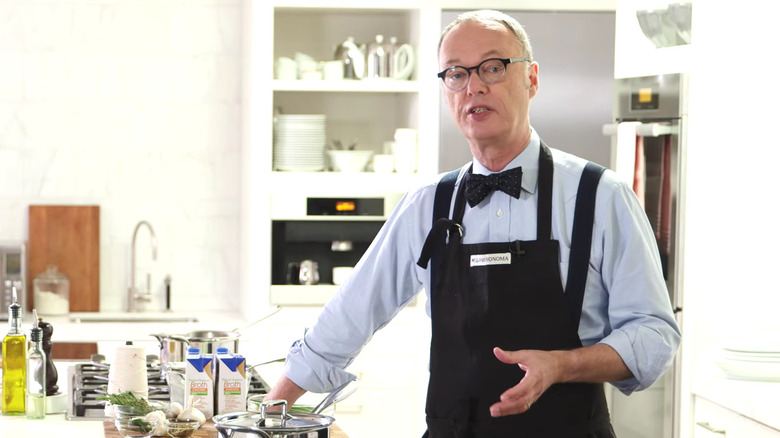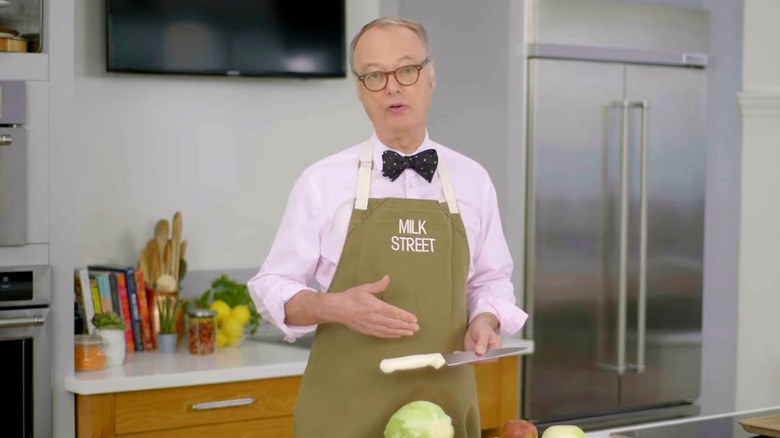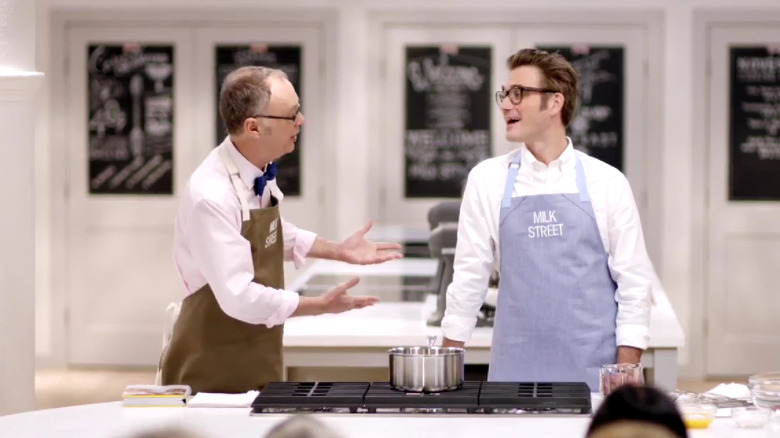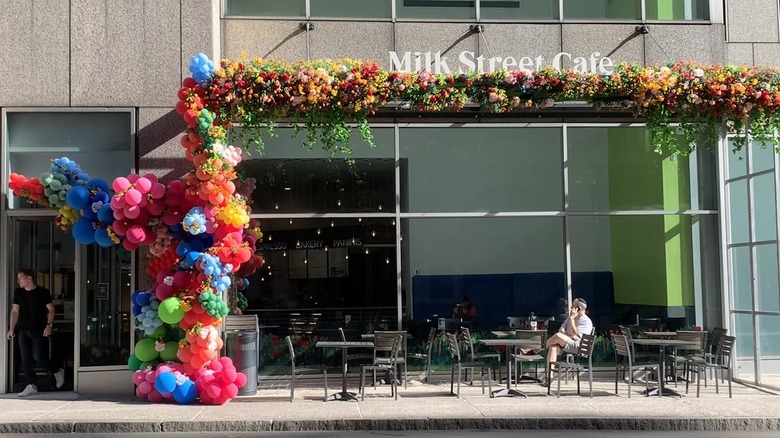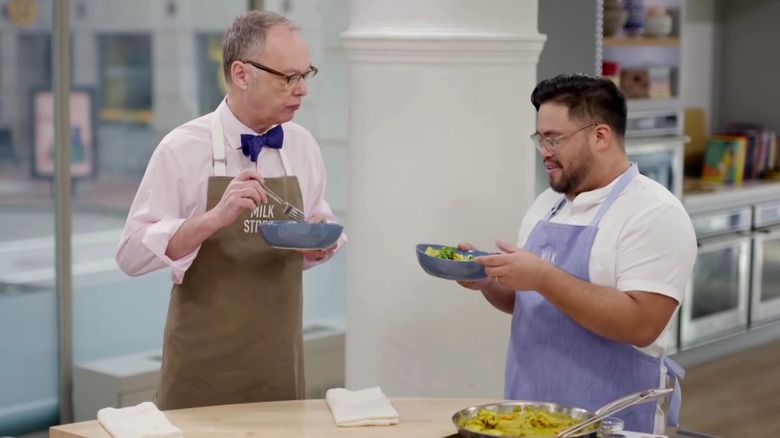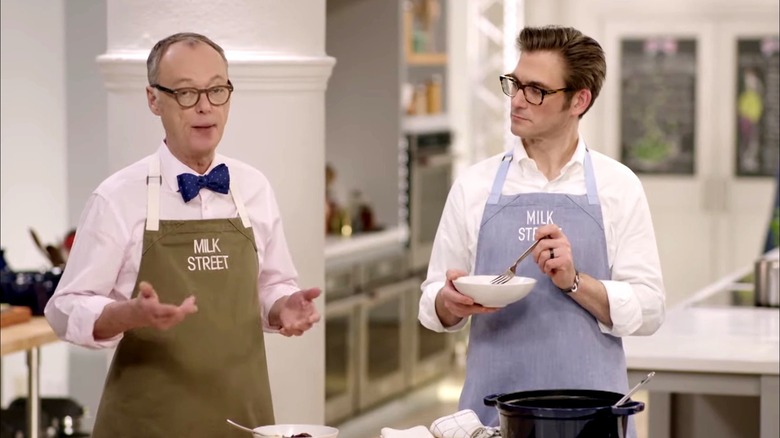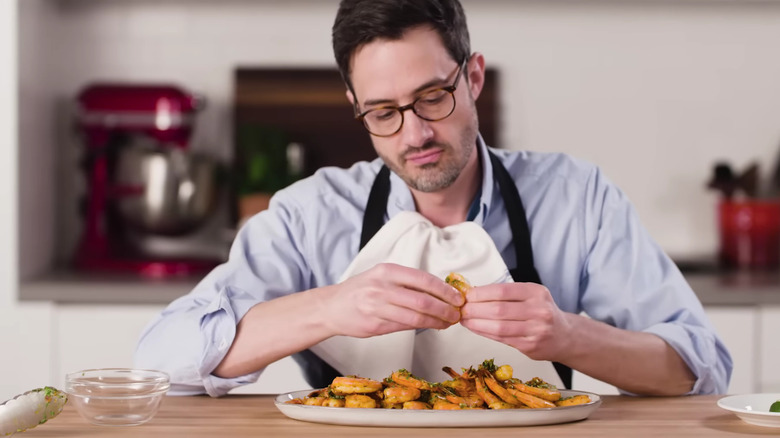Who Is Chef Christopher Kimball And Why Did He Leave America's Test Kitchen?
America's Test Kitchen began with the launch of Cook's Illustrated in 1993. The 32-page magazine was a revelation — it only contained rigorously tested recipes and no advertisements. Word of the magazine's exceptional recipes soon spread and a dedicated readership developed. "America's Test Kitchen," a 30-minute cooking show, soon followed as did radio shows, all held under the America's Test Kitchen Limited Partnership.
The man behind this media empire was Christopher Kimball, an analytical and dispassionate man who became one of the most recognizable celebrity chefs in the United States. For years, Kimball edited Cook's Illustrated and hosted the show "America's Test Kitchen" dressed in his trademark crimson apron and an ever-changing array of bow ties.
Unfortunately, Kimball's involvement with America's Test Kitchen did not last. To the anger of many fans, Kimball left the brand in 2015, and his exit was anything but smooth. Lawsuits and accusations dogged Kimball for years. To make matters worse, many were coming from America's Test Kitchen itself.
Christopher Kimball never worked as a professional chef
Christopher Kimball is the man who taught much of the American public how to cook, through his expertise. Despite this, Kimball has no experience working in restaurant kitchens nor does he hold a culinary degree. Instead of gaining his skills through these traditional routes, Kimball was introduced to cooking by a baker in Vermont as he explained to Mostly Food & Cocktails, "In the town there was a baker, Marie: she sold bread and cookies and pies. I spent a lot of time at her house [...] She had the 'Vermont' technique of teaching — never tell people what to do, just show them what to do."
While always interested in cooking, Kimball decided to study primitive art at Columbia University. He then studied for a PhD in Oceanic art at Cornell. After this intense period of academia, Kimball got a job in publishing. Noticing a dearth of quality, concise cooking magazines, Kimball decided to start his own. He borrowed $100,000 and launched Cook's Magazine — an early iteration of Cook's Illustrated — in 1980. This was the beginning of his storied career in food media.
Kimball does not romanticize cooking or food
America's most influential chefs, food writers, and TV personalities are all guilty of waxing lyrical about food and cooking. Christopher Kimball is not. In fact, he's the opposite and has long maintained that cooking is not a creative act. As he said succinctly to Boston Magazine, "Cooking isn't creative, and it isn't easy. It's serious, and it's hard to do well, just as everything worth doing is damn hard."
Kimball's refusal to view cookery as creative or celebratory gives him a unique perspective on food media. Instead of prioritizing interesting stories or spotlighting trends, Kimball's media brands have always published timeless recipes that have been rigorously tested. This approach won his brands legions of fans over the years with many Americans learning their own skills in the kitchen thanks to the likes of Cook's Illustrated.
Despite his strong opinions though, Kimball has also moved with the times. Unlike Cook's Illustrated when under his editorship, his current publication Milk Street Magazine features color photos and routinely boasts lavish front covers.
He founded both America's Test Kitchen and Cook's Illustrated
Christopher Kimball sold Cook's Magazine in 1989. The experience of running it had not been wholly positive; Kimball had been forced to sell advertising pages — a practice he despised — to keep the magazine afloat. After taking on roles at other publications, Kimball decided in 1993 to relaunch his cookery magazine this time under the title Cook's Illustrated. The magazine thrived, growing from 25,000 subscribers in 1993 to 520,000 in 2002. Cook's Illustrated reached one million subscribers in 2007.
The success of Cook's Illustrated allowed Kimball to expand the brand and he did so in style, launching "America's Test Kitchen" in 2001. This TV program followed a simple format: A couple of recipes were cooked by Kimball who explained both the challenges of the recipes and the science behind them. The show resonated with the American public. By 2014, six million viewers were tuning into America's Test Kitchen every month.
The expansion did not stop there; another magazine Cook's Country was launched in 2004, and a TV show of the same name was first aired in 2008. All these ventures soon fell under the umbrella of America's Test Kitchen.
America's Test Kitchen was different to other food brands thanks to Kimball
America's Test Kitchen, in all its iterations, was markedly different to other American food media brands such as Food Network or Bon Appétit. Christopher Kimball took great pride in this, as was apparent when he spoke to Mostly Food & Cocktails, saying, "The Food Network is about entertainment, not about teaching people to cook [...] Those shows depend entirely on the 'celebrity chef' model." Kimball went on to explain that this is the antithesis of America's Test Kitchen which aims to put the spotlight on recipes instead of individuals.
While the lack of glitz did distinguish America's Test Kitchen from other brands, Kimball's dedication to recipe testing also helped the brand stand out. He implemented a system of "testing and cross-testing," wherein all recipes, whether printed or aired on TV, were tried and tweaked up to 40 times before going live. The process is still used by America's Test Kitchen today and costs the brand around $11,000 per recipe. This rigorous process is a far cry from other food media brands, some of which only cross-test their recipes a single time.
Some suggested Kimball's style sucked the joy from cooking
Christopher Kimball's analytical, formulaic approach to cooking gave many Americans the confidence to begin cooking for the first time. For these beginner chefs, Kimball's style of recipe development meant there was little danger of humiliating failure. All they had to do was follow the recipe. Nothing was left up to chance.
Despite its obvious positives, the method of cooking promoted by America's Test Kitchen is not universally celebrated. A common criticism of the in-depth approach is that it kills any passion or excitement that, for many, is one of cooking's main attractions. This is especially true for those confident in the kitchen who feel America's Test Kitchen's recipes micromanage, leaving them unable to personalize a dish to their exact tastes. The fact many America's Test Kitchen recipes are laced with superlatives like "best" does little to dismiss the notion that the brand believes it's America's Test Kitchen's way or the highway.
Kimball left America's Test Kitchen over a contract dispute
Americans were shocked in December 2015 when it was announced Christopher Kimball had left all America's Test Kitchen brands with immediate effect. The reason was a contract dispute with America's Test Kitchen's parent company Boston Common Press, but by all accounts, the initial breakup was amicable. Kimball had already shot the 2016 seasons of "America's Test Kitchen" and "Cook's Country" and both would air as normal with Kimball hosting. He also remained a minority owner of America's Test Kitchen.
Unsurprisingly, some news outlets pondered the future of America's Test Kitchen, wondering if publications like Cook's Illustrated could survive without the man who fulfilled the role of founder, editor, and host. In an effort to assuage these fears America's Test Kitchen's chief creative officer Jack Bishop explained to The Guardian, "We're a collaborative. It's designed so that the magazines, the books, even the TV shows are all designed to be able to carry on without one individual."
Christopher Kimball's Milk Street was launched in 2016
Christopher Kimball's exit from America's Test Kitchen may have been amicable at first, but all feelings of goodwill were demolished when he launched Christopher Kimball's Milk Street in 2016. This was another food media brand complete with a magazine first released in October 2016. In true Kimball fashion, Milk Street did not rely on the written word alone. The TV program "Christopher Kimball's Milk Street Television" first aired in September 2017, and was soon joined by a weekly radio show "Christopher Kimball's Milk Street Radio" hosted by Kimball himself. A new media empire was beginning to emerge.
Much like America's Test Kitchen, Christopher Kimball's Milk Street also boasts a culinary school with online lessons for subscribers to learn from. Kimball even released a new cookbook "Christopher Kimball's Milk Street: The New Home Cooking" only 13 months after the magazine was first published.
Kimball was sued by America's Test Kitchen's parent company
If you think Christopher Kimball's Milk Street sounds eerily similar to America's Test Kitchen you're not alone. Those at America's Test Kitchen thought the concept and execution were so similar to their own brand that a lawsuit was filed against Kimball in the fall of 2016. Speaking to The Boston Globe at the time, Jack Bishop said, "He kept on saying he wasn't going to compete. I took him at his word. I think everyone on the board was taking him at his word [...] Seeing the physical magazine was the last straw. It feels hauntingly familiar because it is hauntingly familiar."
Bishop was right, the similarities between Milk Street Magazine and Cook's Illustrated were jarring. They even shared the same number of pages. The lawsuit was not limited to editorial practices, however. It also included accusations that Kimball had replicated America's Test Kitchen business model and copied email addresses from its servers, all while he was still an employee at America's Test Kitchen.
The lawsuit was finally settled in 2019
In 2019, nearly three years after the lawsuit was filed, the two parties reached a settlement. Although exact details were not forthcoming, it was revealed that Christopher Kimball would relinquish all his shares in America's Test Kitchen. In return, America's Test Kitchen would consent to Christopher Kimball's Milk Street competing against it. The settlement also resolved Kimball's countersuit which alleged defamation against America's Test Kitchen due to a media campaign. Kimball also sued for the huge losses of potential investments in Christopher Kimball's Milk Street due to America's Test Kitchen's initial lawsuit.
Prior to the settlement, America's Test Kitchen's CEO David Nussbaum made it clear the company had not suffered from Kimball's departure. In a 2018 interview with Forbes he said, "Despite a change in show hosts, ATK and Cook's Country TV remain the top two practical cooking shows on television. We've improved our technology, increased our social-media budget by four times, [and] built best-in-class studios and kitchens." Regardless of the security of America's Test Kitchen, both parties were reportedly eager to avoid a court hearing.
Kimball also went through two additional lawsuits
Starting Christopher Kimball's Milk Street was anything but a smooth experience for Kimball. As well as the America's Test Kitchen lawsuit, he also faced two other lawsuits as he set up the company, the first of which came from Marc Epstein the owner of Milk Street Cafe, a catering company and café located in downtown Boston. In the lawsuit, Epstein alleged trademark infringement, saying that the similar name was confusing the public and impacting his business. Epstein's lawsuit was ultimately unsuccessful.
A further lawsuit was filed against Kimball by his ex-wife Adrienne Kimball. In her lawsuit, Adrienne Kimball stated that Kimball's exit from America's Test Kitchen had unlawfully affected their divorce agreement. She receives 35% of Kimball's income and with his position at America's Test Kitchen terminated, this amount was drastically reduced. His ex-wife also alleged that Kimball was not paying sufficient child support.
Milk Street has given Kimball freedom to explore other cuisines
Setting up Milk Street might have been a nightmare for Christopher Kimball, but running it has given him a great deal of creative freedom. In contrast to his work at America's Test Kitchen, which predominately focused on quintessentially American dishes like apple pie, the recipes published in Milk Street Magazine and shown on "Milk Street Television" span a huge variety of world cuisines.
These recipes are not classic iterations of traditional dishes for reasons Kimball explained to Boston Magazine, saying, "What does real home cooking look like in Bangkok or Mexico City? It's not, for the most part, the classic dishes we associate with a particular culture or country. It's a real-world approach that is much faster and simpler." In Kimball's mind, Milk Street's less traditional approach to cooking reflects the fluidity of modern food in ways that older publications like Cook's Illustrated do not.
Christopher Kimball's Milk Street offers free cooking classes
Aside from a range of paid classes, Christopher Kimball's Milk Street online cookery school also offers several free, self-paced classes that are available for anyone to view. During 2020, when the United States was in lockdown, Milk Street offered over a dozen, free online courses ranging from "Advanced Techniques: Vegetables" to "The New Stew."
Of all these courses, three remain free to this day: "Knife Skills," "Cookish Part 1: How to Throw It Together," and "The Spice Kitchen." All other courses cost around $20 to access. Aside from these classes, Milk Street also offers Virtual Private Events in which small groups are led through recipes as well as being taught key techniques and principles. The company also has an outreach program, giving a few charitable organizations in-person cooking education classes as well as virtual mentorship.
The most ambitious of all Milk Street culinary education programs is Milk Street Culinary Tours. These are guided, eight-day trips to some of the world's gastronomic capitals, priced at either $4,000 or $5,250 depending on location. Upcoming tours include journeys to Oaxaca, Istanbul, and Athens.
America's Test Kitchen has survived without Kimball
When Christopher Kimball left America's Test Kitchen, many people wondered whether the brand could continue without him. Turns out, yes it can. America's Test Kitchen has not only stayed in business to the present day, it has evolved, incorporating many approaches to food. This includes new innovations like Cook's Science, telling food science stories and talking to farmers and university professors alike.
From a statistical point of view, Kimball's exit was not overly damaging. In 2019, several years after Kimball had left, the brand boasted 1.3 million subscribers for its two print magazines. A further 420,000 were subscribed to the digital arm of America's Test Kitchen. The company was further buoyed by exceptional book sales and hundreds of thousands of commissions from purchases made via affiliate links.
This is not to say it's been plain sailing for America's Test Kitchen, however. In March 2023, it was announced that 23 members of staff were being laid off due to a reorganization of the business in an effort to improve the company's net income. This included the entire America's Test Kitchen Kids Team, which was completely shut down, and was previously responsible for producing digital food content for children.
